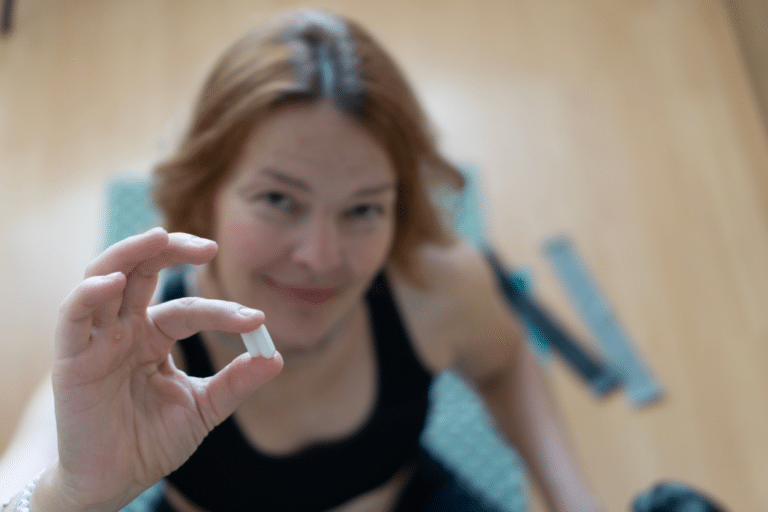If you haven’t paid much attention to how much sugar you consume and what it may be doing to your health, now’s the time to give it some thought. There are articles coming out every day about the effects of sugar on weight, hormones, inflammation and a laundry list of chronic conditions but what you don’t hear a lot about is what it does to your brain.
Your Brain on Sugar
Overconsumption of sugar is increasingly linked to brain-related health issues such as depression, learning disorders, memory problems and overeating. Let’s take a closer look.
Sugar creates a cycle of crazy cravings.
When you eat sugar, just like any food, it activates your taste receptors. Then, signals are sent to the brain, lighting up reward pathways and causing a surge of feel-good hormones, like dopamine, to be released. Basically, sugar hijacks the brain’s reward pathway… leading you to seek more and more of that dopamine hit. This requires more and more sugar. And while stimulating the brain’s reward system with a piece of chocolate now and then is pleasurable and probably harmless, continuous stimulation can lead to loss of control, cravings, and increased tolerance to sugar. Think crack.
It impairs memory and learning skills.
In a 2012 study on rats, researchers at UCLA found that a diet high in fructose hindered learning and memory by literally slowing down brain activity. Rats who over-consumed fructose had damaged synaptic activity in the brain, meaning that communication among brain cells was impaired.
Heavy sugar intake caused the rats to develop insulin resistance. Insulin helps brain cells communicate better and form stronger memories. So when insulin levels in the brain are lowered as the result of excess sugar consumption, thinking can be impaired.
It may cause or contribute to depression and anxiety.
Eating a donut or drinking a soda causes blood sugar levels to spike and then crash. You may find yourself feeling anxious, moody, or depressed when this crash happens.
[bctt tweet=”Regardless of how you approach it, there is no downside to giving up sugar. Your body will thank you for it.” #sugar #highcarbs #sugardetox #perimenopause #menopause #hormones #DrAnnaGarrett #AnnaGarrettAsheville” username=”DrAnnaGarrett”]
Sugar or high carb foods can affect the neurotransmitters that help keep your mood stable. Eating sugar stimulates the release of the mood-boosting neurotransmitter serotonin. Constantly over-activating the serotonin pathways can deplete our limited supplies of this neurotransmitter, which then contributes to symptoms of depression.
It’s a risk factor for cognitive decline and dementia.
A growing body of research suggests that a sugar-heavy diet can increase risk for developing Alzheimer’s disease. A 2013 study found that insulin resistance and blood glucose levels are linked with a greater risk for developing neurodegenerative disorders like Alzheimer’s.
Ready to Give It Up?
If you’re ready to give up sugar, great! Unfortunately, this is not one of those situations where gradually cutting back is the best approach (in my opinion). Best to go cold turkey. Cutting all sugar out of your life is next to impossible, so start with deep-sixing foods that have added sugar. This will help your blood sugar and insulin levels stay steady all day so that your body uses glucose efficiently.
Your mission: avoid foods that have more than 6 grams of sugar per serving.
What to Expect with a Sugar Detox
The first week is the hardest when you give up sugar. After that it gets much easier. After a couple of weeks, you’ll notice that eating really sweet foods isn’t appealing and that natural sugars are enough to satisfy you. You can expect brighter eyes, clearer skin and fewer dark circles. You’ll also have more energy and fewer mood swings (once you get past the crabby first part).
Can I Use the Fake Stuff?
Nope. Though they don’t contribute calories, artificial sweeteners are 100 times sweeter than sugar. When you eat or drink something that is artificially sweetened, your brain expects the calories to match the sweetness. When this doesn’t happen, it kicks off cravings and you’ll find yourself in front of the vending machine very quickly!
I’m Not Gonna Lie
Giving up sugar is challenging, especially if you have the genes that give you more of a sweet tooth. Some of us don’t taste sweetness as well as we should, so it takes more to satisfy us. And some people have the “cookie jar” gene… sugar sets off an avalanche of uncontrolled eating with this variant. Knowing the genes that affect how you handle sugar can be very useful when creating a plan for habit change. Regardless of how you approach it, there is no downside to giving up sugar. Your body will thank you for it!
—
Dr. Anna Garrett is a perimenopause/menopause expert and Doctor of Pharmacy. She helps women who are struggling with symptoms of perimenopause and menopause find natural hormone balancing solutions so they can rock their mojo through midlife and beyond. Her clients would tell you that her real gift is helping them reclaim parts of themselves they thought were gone forever.
Find out more about working with her at https://www.drannagarrett.com/work-with-me/ or click the button below to talk one-on-one with a hormone expert!




